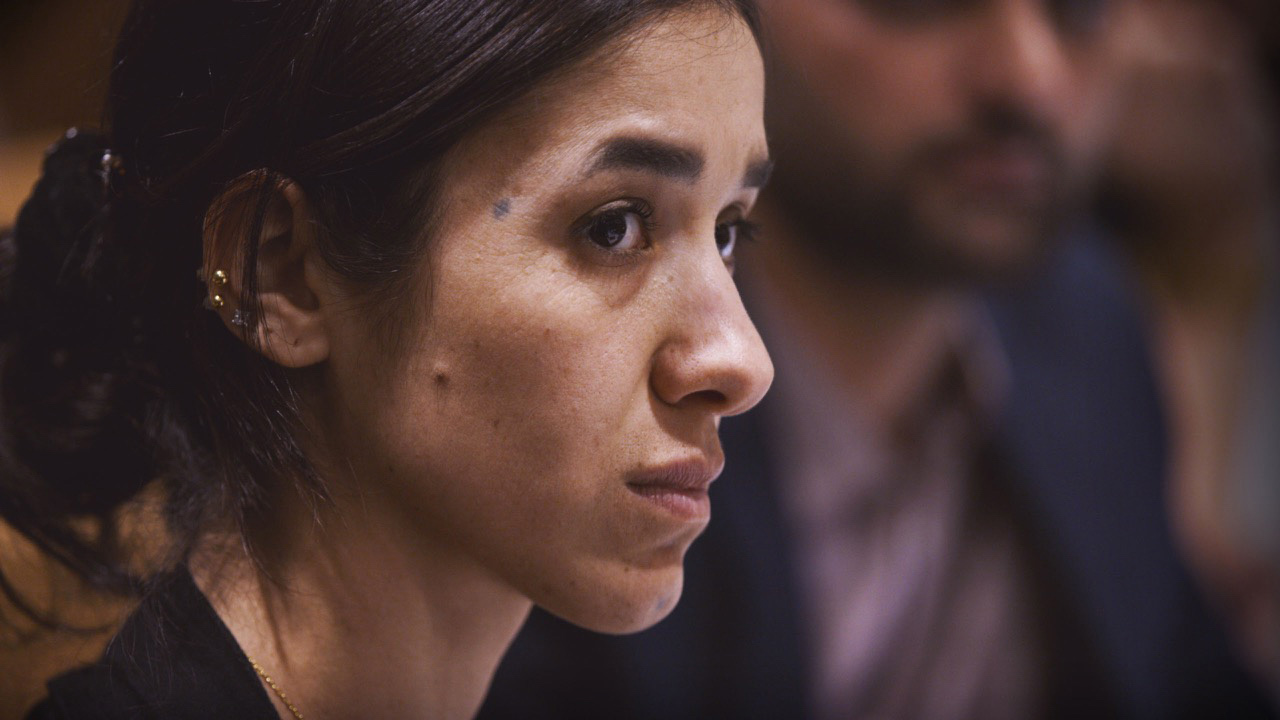How the biggest movies of Sundance 2018 went small
On the microscopic introspection of America's premier film festival


A free daily email with the biggest news stories of the day – and the best features from TheWeek.com
You are now subscribed
Your newsletter sign-up was successful
While the daily news makes it seem like the world is descending into chaos and conflict, some of our most accomplished and insightful filmmakers have been spending the 2018 edition of the Sundance Film Festival pondering a question that may strike some as frivolous: "What makes us us?"
This year's Sundance movies didn't duck hot-button issues, by any means. In the first four days of the fest, I've seen stories about Black Lives Matter, PTSD, opioid addiction, #MeToo, Russian interference in American politics ... you name it. It's just that a lot of our best writers, directors, and actors are looking at the big picture one square inch at a time.
Consider The Catcher Was a Spy. Ostensibly an old-fashioned World War II movie, it's preoccupied with the paradox of its title character: a man who asserts his identity by becoming whatever his country needs him to be. Paul Rudd stars as real-life Major League Baseball player Moe Berg, who loaned his genius-level intellect to the OSS in the 1940s. Most of the film consists of stodgy-but-enjoyable cloak-and-dagger adventure, but it's distinguished by Rudd's nuanced performance. He's terrific playing an enigmatic Jewish intellectual whose ultimate goal is just to fit in — first by playing America's signature sport, then by devoting himself to espionage.
The Week
Escape your echo chamber. Get the facts behind the news, plus analysis from multiple perspectives.

Sign up for The Week's Free Newsletters
From our morning news briefing to a weekly Good News Newsletter, get the best of The Week delivered directly to your inbox.
From our morning news briefing to a weekly Good News Newsletter, get the best of The Week delivered directly to your inbox.
In the biopic Colette, the story of a libertine French writer is nearly the opposite of Berg's. This movie is about an under-appreciated woman (splendidly played by Keira Knightley), fighting to get her due. Colette focuses primarily on the now-famous author's young adult years, when her talent was exploited by a playboy husband (played by Dominic West), who took credit for her autobiographical Claudine novels. Still Alice director Wash Westmoreland emphasizes the headiness of those days, when the headstrong proto-feminist explored her sexuality along with her art. Similar to The Catcher Was a Spy, the film celebrates someone who wrested control of her own story.
This same theme runs through Don't Worry, He Won't Get Far On Foot, writer-director Gus Van Sant's adaptation of cult cartoonist John Callahan's autobiography. Joaquin Phoenix stars as Callahan, an alcoholic who was paralyzed in a car accident, then turned his life around by going through a 12-step program. The movie could use more about Callahan's hilariously dark comics, and less about the particulars of group therapy. Still, Van Sant admirably avoids the stereotypical "breakthrough" moments of the recovery drama, making Don't Worry more about the small triumph of Callahan making sense of himself, by telling and retelling the same jokes and personal anecdotes in books, in AA, and even to strangers on the street.
The scenes of Callahan repeating his self-mythology are echoed by two of this year's more acclaimed Sundance films. In Alexandria Bombach's absorbing and emotional documentary On Her Shoulders, Nadia Murad becomes an international spokesperson for the oppressed Yazidi minority in Iraq. And as part of her mission, she relives the worst moments of her life, over and over, in interviews and public appearances. In documentary Jennifer Fox's boldly autobiographical The Tale, Laura Dern stands in for the director, playing a filmmaker who at middle age begins to grasp that an incident in her youth — previously framed in her mind as a wild sexual adventure — was in fact a crime.
The Tale has set Sundance abuzz in part because Fox's story of a teen girl being manipulated by an adult man is so pertinent to the conversations we've been having lately about power, harassment, and consent. But the film is more than a comment on what's happening now. It's an uncompromising look at how our memory tricks us, and how changing a few details in the way we tell our stories can transform their meaning.
A free daily email with the biggest news stories of the day – and the best features from TheWeek.com
Fox isn't the only documentarian making a fiction(ish) feature debut at this year's Sundance. Bart Layton was at the festival six years ago with The Imposter, a twisty documentary that toyed with audience expectations while recounting the tale of an amazing con. Layton's new film American Animals weaves documentary footage into a recreation of a semi-comic true story, about four Kentucky college kids who tried to steal some of the rarest books in the world. The gimmicky structure can't overcome the too-familiar beats of the heist picture — or the "cocky boys making idiotic choices" sub-genre, for that matter. But there's something undeniably poignant about how the "fun" movie version of this true-crime adventure keeps bumping up against Layton's interviews with real people, who reflect on what they did and how crummy they felt after.
The main characters in American Animals are a bored art student named Spencer (Barry Keoghan) and his reckless best friend Warren (Evan Peters), whose toxic dynamic delivers one of the film's main points: that even fairly smart guys can goad each other into catastrophe. That same message comes through clearly in Blindspotting, which stars Daveed Diggs and Rafael Casal as Colin and Miles, two working-class Oakland lifers who find their "hood" aesthetic and occasional mild criminal activity unwelcome in an increasingly gentrifying city.
For its first hour, Blindspotting has an appealing shaggy, location-specific vibe, reminiscent of some of the great American B-movies of the '70s. Then Diggs and Casal (who also co-wrote the script) try way too hard to give their story a meaningful ending, and choke a bit on earnestness. Nevertheless, the movie's always sharp about the fine distinctions between the millennials who appropriate "ghetto culture" and the folks who actually grew up in it — and about how the white Miles can get away with having a thuggish demeanor while the black Colin watches every step.
Some of the most argued-about films at Sundance this year have been documentaries. Maxim Pozdorovkin's collage-doc Our New President assembles eye-opening clips from the Russian media's coverage of President Donald Trump, revealing how disinformation can be shaped into a persuasive narrative. Provocative in a different way, Elan and Jonathan Bogarin's 306 Hollywood finds the spirit of the siblings' grandmother in her decades of clutter, as the filmmakers treat canceled checks and Band-Aid boxes of coins the way a museum archivist would handle the results of an archeological dig. 306 Hollywood definitely skews too far into the cutesy, but for the most part the Bogarins perform a marvelous magic trick, turning ephemera into beautiful, meaningful art.
Sundance audiences and critics have been split on Our New President and 306 Hollywood, but not on the jaw-dropping Three Identical Strangers. Tim Wardle's documentary looks back at a human-interest story that captivated the world in the early '80s, when adult triplets separated at birth found each other almost by accident. After the initial hubbub died down, the brothers discovered the disturbing truth about why they were split up, and the revelation spoiled their happy ending. In its challenging final stretch, Three Identical Strangers digs deep into the question of heredity and socialization, asking whether the outline of our lives is inked-in from the moment we're born.
That same question haunts Nancy, the feature filmmaking debut of writer-director Christina Choe. Andrea Riseborough stars as a melancholy 30-something who's spent much of her adult life either taking care of her mean-spirited mother or lying about herself on the internet. After her mom dies, Nancy hears about a well-to-do academic couple who've spent 30 years looking for a daughter who disappeared at age 4. She calls them to suggest that maybe she's their girl. Choe smartly refuses to clarify whether her heroine is a crook or a kook, instead letting the characters and the viewer play the "what if?" game together, while pondering — partly lyrically, partly spookily — whether these people could make each other happy regardless of whether they're actually family.
The movies above differ in approach, genre, and tone ... sometimes a little, sometimes broadly. But there's still something uncommonly raw and yearning about this first batch of Sundance 2018 films, which are so deeply concerned with people desperate to understand why their lives turned out as they have. Are we defined by their traumas? Their screw-ups? Their genes? Before we try to resolve our political differences, don't we need to understand why we believe what we believe?
In a way, writer-director Tamara Jenkins' Sundance opening night sensation Private Life — her first film since the Oscar-nominated The Savages, over a decade ago — encapsulates where these kinds of questions lead, for better and worse. This is a brittle dramedy, about an aging, artsy New York couple named Richard and Rachel (played by Paul Giamatti and Kathryn Hahn), who use every medical resource available to them to conceive a child. The film isn't just painfully honest about the specific complications of IVF, it also sprawls out — in a sometimes ungainly fashion — to cover the way changing times can affect careers and a marriage.
Enlisting a flighty young step-niece to be their egg donor forces Richard and Rachel to re-evaluate who they are and what they really want. Like a lot of people, they're eager to start a family so that something of themselves may survive after they're gone. Even if they're not sure who their "selves" really are, it maybe — maybe — says something reassuring about humanity that these two have such faith in their own worth. In a Sundance slate full of stories about stories, here's one about why we keep fighting against the words "The End."
Next week: The second half of my Sundance report will include a look at innovative storytelling techniques on display in Park City in 2018, as well as coverage of movies starring Jon Hamm, Kelly MacDonald, Nicolas Cage, Mia Wasikowska, Robert Pattinson, and Ruth Bader Ginsburg.
Noel Murray is a freelance writer, living in Arkansas with his wife and two kids. He was one of the co-founders of the late, lamented movie/culture website The Dissolve, and his articles about film, TV, music, and comics currently appear regularly in The A.V. Club, Rolling Stone, Vulture, The Los Angeles Times, and The New York Times.
-
 Quiz of The Week: 14 – 20 February
Quiz of The Week: 14 – 20 FebruaryQuiz Have you been paying attention to The Week’s news?
-
 The Week Unwrapped: Do the Freemasons have too much sway in the police force?
The Week Unwrapped: Do the Freemasons have too much sway in the police force?Podcast Plus, what does the growing popularity of prediction markets mean for the future? And why are UK film and TV workers struggling?
-
 Properties of the week: pretty thatched cottages
Properties of the week: pretty thatched cottagesThe Week Recommends Featuring homes in West Sussex, Dorset and Suffolk
-
 Walter Isaacson's 'Elon Musk' can 'scarcely contain its subject'
Walter Isaacson's 'Elon Musk' can 'scarcely contain its subject'The latest biography on the elusive tech mogul is causing a stir among critics
-
 Welcome to the new TheWeek.com!
Welcome to the new TheWeek.com!The Explainer Please allow us to reintroduce ourselves
-
 The Oscars finale was a heartless disaster
The Oscars finale was a heartless disasterThe Explainer A calculated attempt at emotional manipulation goes very wrong
-
 Most awkward awards show ever?
Most awkward awards show ever?The Explainer The best, worst, and most shocking moments from a chaotic Golden Globes
-
 The possible silver lining to the Warner Bros. deal
The possible silver lining to the Warner Bros. dealThe Explainer Could what's terrible for theaters be good for creators?
-
 Jeffrey Wright is the new 'narrator voice'
Jeffrey Wright is the new 'narrator voice'The Explainer Move over, Sam Elliott and Morgan Freeman
-
 This week's literary events are the biggest award shows of 2020
This week's literary events are the biggest award shows of 2020feature So long, Oscar. Hello, Booker.
-
 What She Dies Tomorrow can teach us about our unshakable obsession with mortality
What She Dies Tomorrow can teach us about our unshakable obsession with mortalityThe Explainer This film isn't about the pandemic. But it can help viewers confront their fears about death.
